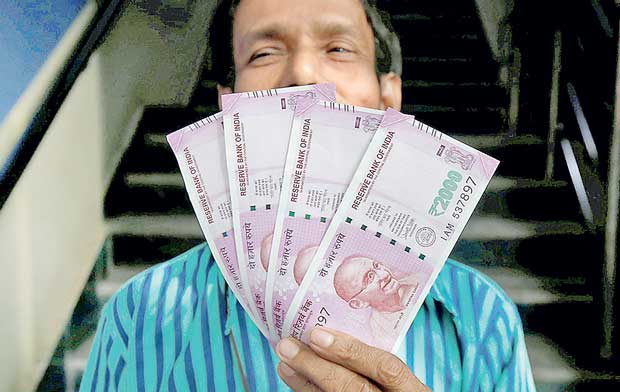08 May 2017 - {{hitsCtrl.values.hits}}

 Since the November 2016 announcement that demonetised 86 percent of India’s currency in circulation, Rs.5,400 crore (US $ 837 million) of undisclosed income has been detected. Critics will surely latch on to this rather measly figure to declare that demonetisation has palpably failed in expropriating owners of ‘illegal money’. Such criticism would only further display the inherent ideological bias and politically-motivated opposition of these critics.
Since the November 2016 announcement that demonetised 86 percent of India’s currency in circulation, Rs.5,400 crore (US $ 837 million) of undisclosed income has been detected. Critics will surely latch on to this rather measly figure to declare that demonetisation has palpably failed in expropriating owners of ‘illegal money’. Such criticism would only further display the inherent ideological bias and politically-motivated opposition of these critics.
This bias has led Nobel prize-winning economist Amartya Sen to declare Prime Minister Narendra Modi to be a ‘despot’. Former Prime Minister Manmohan Singh lampooned the measure as ‘organised loot’. Some economists had spelled the demise of small and medium enterprises (SMEs) that were cash-dependent. Others like Kaushik Basu and Arun Kumar had forecasted a sustained downward spiral that would land the Indian economy in severe and deep recession. And some like Prabhat Patnaik and his co-authors pointed to similar action in the former Soviet Union as contributing to its break up in 1990. The ominous implications for India were clear.
From organised loot to the possible breakup of the country, demonetisation was attributed with all possible negative outcomes by its trenchant critics. In the light of developments in the post-demonetisation period, these critics should publicly recant and apologise.
Nothing even remotely resembling the dire forecasts of those viscerally opposed to Modi has come to pass and nor is it at all likely to emerge. Gross domestic product (GDP) growth in 2017–18 will be higher than in 2016–17 because the global economy is reviving and domestic investment is about to start rising as well. Export earnings, to which the unorganised sector contributes significantly, have been rising since October 2016.
The rupee, which was headed towards Rs.70 for one US dollar in November, has actually strengthened by more than 6 percent since January 2017, despite the US Federal Reserve raising interest rates. Inflation is below 4 percent. The fiscal deficit remains within targets set by the Fiscal Responsibility and Budget Management Act and the current account deficit is at manageable levels. Real estate prices are beginning to creep up again in metros like Mumbai and Delhi and construction activity, pushed strongly by the government’s promotion of affordable housing, is on the rise. In complete contrast to the critics’ ominous warnings, the Indian economy is well on track to sustain its growth momentum. It may even adjust to a higher growth trajectory as investors, more confident of transparent governance, lower levels of corruption and an easier environment for doing business, start expanding capacities. The Indian economy not only avoided a crisis as a result of demonetisation but has perhaps come out stronger and better primed for growth.
But the fight against criminal wealth is certainly not over. The finance minister has pointed out that the Income Tax Department has identified 180,000 bank accounts in which deposits do not reconcile with declared incomes. The average deposits in these accounts has been about Rs.3.01 crore (US $ 466,890), far above the Rs.2.5 lakh (US $ 3877) seen as the ‘safe’ amount to be deposited. These account holders are now being contacted and will hopefully
be pursued.
Going forwards, the Benami Properties Act — which prohibits certain financial transactions where the purchaser is the agent of an unknown beneficiary — and the instructions to link all bank accounts with Aadhaar biometric ID numbers will help unearth hordes of illegal wealth. And limits on cash transactions linking Aadhaar with Permanent Account Numbers (PAN) will also identify a huge number of fictitious and ghost depositors. Lowering the limit on political funding, though not optimal, will also put some constraint on illegal funds being used for political purposes.
Having used the most drastic measure for signalling their commitment to combating corruption, Modi and his ministers can hardly afford to go soft on this now. The die has been cast and it will be very difficult to roll back.
There is simply no room for complacency. The wild show of money power in the now deferred RK Nagar constituency by-election shows that the malaise is chronic and widespread. Corruption related to the political process will have to be fought for a long time. It is time for a real public debate on the issue of electoral funding, which will hopefully generate ideas to minimise, if not eliminate, corruption.
But an even greater danger lurking is the tyranny of the taxman. It is already reported that in several cities, intrepid tax inspectors are using their extra powers to harass honest taxpayers. This must change. Investors have to be convinced that additional powers granted to the Income Tax Department through recent amendments will neither apply retrospectively nor with vengeance or complete impunity.
The Modi government has benefited from people’s positive response to demonetisation. He now has to demonstrate his unflinching support for domestic and foreign investors by reining in the tax officials, demanding utmost honesty of them. This means ruling out retrospective action except in the most exceptional case and assuring both that the Income Tax Act is not a tool in government hands to ‘sort out’ stubborn investors or
political opponents.
Only then will demonetisation produce its desired outcome of ushering in a new culture of honest economic activity in India.
(Courtesy East Asia Forum)
(Rajiv Kumar is Director, Pahle India Foundation, Delhi, and Chancellor of Gokhale Institute of Politics and
Economics, Pune)
08 Jan 2025 38 minute ago
08 Jan 2025 1 hours ago
08 Jan 2025 3 hours ago
08 Jan 2025 4 hours ago